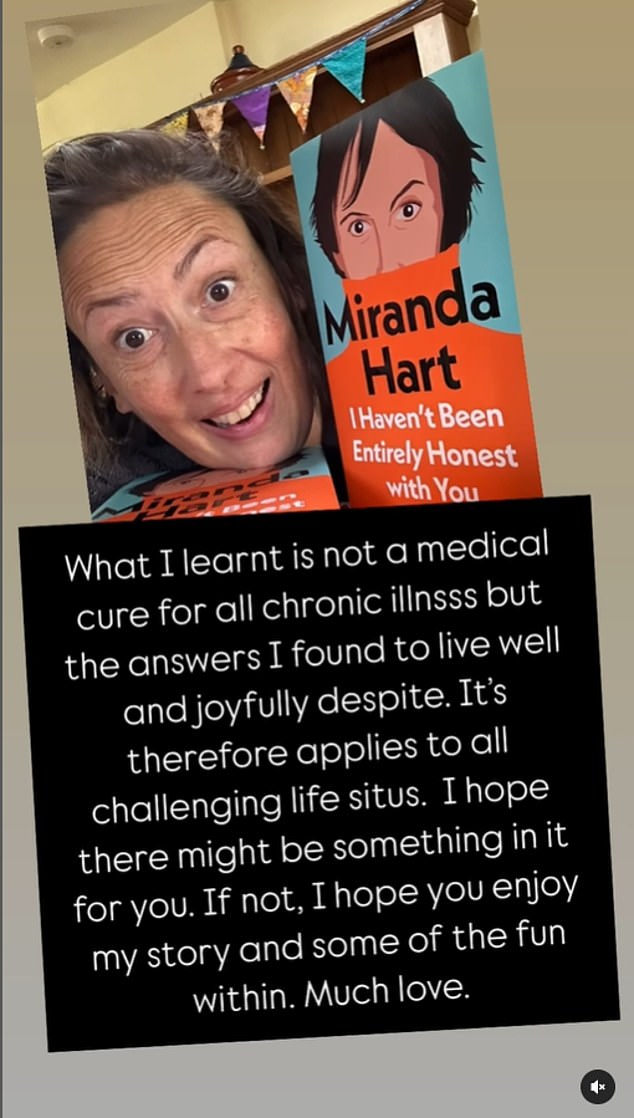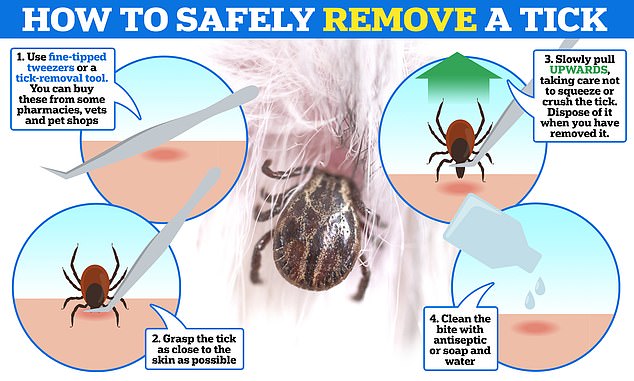The truth behind Miranda Hart’s controversial claims of a cure for chronic fatigue – as the star is accused of peddling pseudoscience
Comedian Miranda Hart has come under fire this week for suggesting she has found a cure for her chronic fatigue syndrome.
In her new autobiography, the 51-year-old – best known for her BBC sitcom Miranda – recounted her 30-year battle that ‘left her bedridden and joyless’.
Initially diagnosed with agoraphobia, she later discovered that undiagnosed Lyme disease had developed into chronic fatigue syndrome, also known as myalgic encephalomyelitis (ME).
But in her book, the star suggests that the causes and solution to conditions such as long Covid and ME lie in ‘the brain’s heightened stress response’.
Critics have slammed the Call The Midwife actor for promoting ‘pseudoscience’ and holding ‘dangerously outdated’ views on the circumstances.
In her new autobiography, the 51-year-old – best known for her BBC sitcom Miranda – opened up about her 30-year health battle during which she was initially diagnosed with agoraphobia.

In response to the online comments, Hart acknowledged that people had misunderstood that reduced stress was beneficial for her symptoms and that it did not mean she had found a cure.

in her book, the star suggests the causes and solution to conditions such as long-term Covid and ME are down to ‘the brain’s heightened stress response’
Viking star, actor Jennie Jacques, who developed ME in 2019, said: ‘Nothing personal at all @mermhart… I believe your intentions are in the right place, but it would be irresponsible of me not to say anything about it.
‘With great power comes great responsibility. Eighty to ninety percent of this story is dangerously outdated.”
Frances Ryan, a journalist and activist for people with disabilities, also wrote on
“If you write a book after you’ve recovered, you have a special responsibility to be accurate to readers who are also desperate to recover.”
In response to the online comments, Ms Hart claimed she had been misunderstood.
She added that reducing stress was beneficial for her symptoms and that she did not mean that she had found a cure.
Some also pointed out that Ms. Hart endorsed a book by Alex Howard in 2021 called Decode Your Fatigue.
The cover features a quote from the comedian: “A hopeful, practical book to help people move from debilitating fatigue to a purposeful, joyful life.”
Howard is the founder of the Optimum Health Clinic, which teaches courses in the Lightning Process and claims to ‘train the brain to ward off tired thoughts’, including treating conditions such as ME, depression and chronic pain.
But in 2022, health watchdog the National Institute for Health and Care Excellence recommended that the Lightning Process should not be used by GPs.
“The Lightning Process is not a treatment we endorse or recommend for people with ME/CFS,” says Dr Charles Shepherd, medical advisor to the UK ME Association.
Meanwhile, research linking stress to these long-term conditions has long been divided.
Research into long Covid is also still in its infancy.
Many people in the chronic disease community say they hate the assumption that stress caused their condition, and report that this stigma itself can cause stress.
There is currently no cure for ME and no test can diagnose ME.
Treatment instead revolves around therapy, lifestyle changes, and the use of certain medications to relieve symptoms such as pain and sleep problems.
According to the NHS, this may include cognitive behavioral therapy and advice on how to best use the energy you have.
One current study, led by Professor Chris Ponting, an expert in genome biology at the University of Edinburgh, aims to find the genetic causes of the condition.
About 18,000 people with ME in Britain provided DNA samples for analysis.

The comic was officially diagnosed during lockdown and believes she contracted Lyme disease when she was 14 after battling nasty flu-like symptoms in Virginia.
Professor Ponting told the BBC: ‘We hope the results can tell us what goes wrong for so many people.
‘It will take a huge step change in research and clinical practice before people with ME in Britain can be treated in the same way as most other people with other diseases.
‘They are forgotten, ignored and abandoned.’
It is intended to indicate where research should go and accelerate steps toward diagnostic tests and new drug treatments.
For example, if genetics suggest the immune system is involved, an army of immunologists who have worked on other diseases could be called in, he said.
Symptoms of CFS vary from patient to patient and over time.
The most common include extreme physical and mental fatigue that does not go away with rest, as well as problems with sleeping, thinking, memory and concentration.
Other symptoms include muscle or joint pain, sore throat, headache, flu-like symptoms, dizziness and nausea, as well as a fast or irregular heartbeat.
In its mildest form, CFS patients may have difficulty performing everyday activities, but may have to give up hobbies and social activities to rest.
The most severe CFS patients are essentially bedridden and in full-time care, unable to feed or wash themselves, or even go to the toilet without assistance.
Charities say there are at least 240,000 people with ME living in Britain, although exact figures are difficult to determine.
According to the charity ME Research UK, around one in four of these people have severe or very severe ME.

Removing a tick from your own skin is critical to preventing the risk of infection or contracting other diseases, including Lyme disease. The NHS has a four-step routine to safely identify and remove ticks
Lyme disease is a bacterial infection spread by ticks and can cause common flu-like symptoms, including fatigue, headaches, swollen joints and fever, which can last for a few weeks, but for reasons not yet clearly understood, some sufferers suffer from it for years On.
In her memoir, Miranda says she struggled with the “nerve-wracking neurological symptoms” she first experienced when she was fourteen.
She explained that it became “significantly worse” as she approached her 40s, along with increasing fatigue and cell exhaustion.
However, she said on Instagram this week: ‘I’m not saying I’ve found a cure or claim to have any in-depth medical knowledge for ME.
‘It is a terribly misunderstood condition and many do not get any relief. Which hurts my heart.
‘I simply believe that reducing anxiety when living with an illness can only benefit our quality of life.
‘But it is very difficult and I can only speak from my experience. It was research that also covers all aspects of life.’
She has now disabled commenting on her Instagram posts and shared a separate video in which she said: ‘I’m not a medical professional’.
In her book, the actor also revealed that she found it easier to talk to others about her illness after Covid made headlines for a long time during the pandemic.
‘After long Covid this is better understood; I can say that I have long Lyme and people understand it a little easier,” she wrote.
‘Year after year, the category ‘chronic fatigue, ME, long post-viral condition’ is becoming more and more visible. I hope so, because it is a very real, serious, physical illness.”
When she received her diagnosis, she also said, “I stopped that Zoom call, closed my laptop and sat there, silent and stunned.
‘So many emotions, I was shocked, but I also immediately felt a deep well of sadness and disappointment.
‘For more than thirty years I knew something was wrong.
‘I remembered all the times I had said to different doctors: ‘I feel toxic and poisoned, or: it’s like I have the flu every day, but I don’t have a fever.’
‘(It’s amazing how the body can sometimes literally tell us what’s going on.) I felt the anger rising at the moments I was told I must have agoraphobia.
‘I would try to treat it as such when, as it turned out, it was the lack of energy and extreme light and sound sensitivity that caused my body to crash when I went outside in any activity or in a stimulating environment .’
